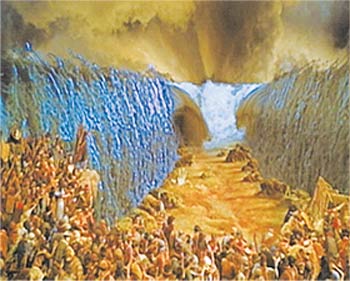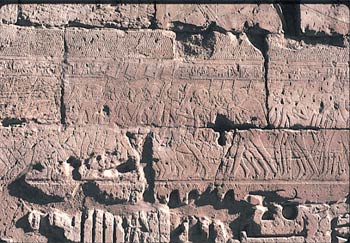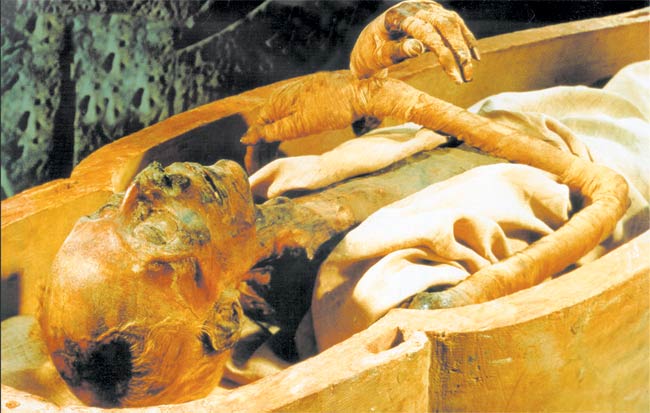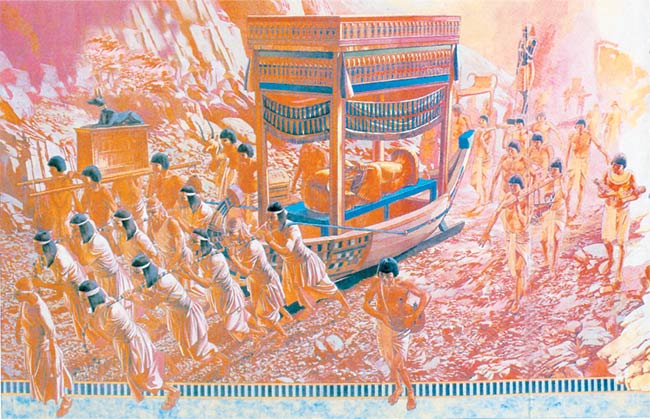Exodus from Egypt and the Drowning of Pharaoh in the Sea
There is a limit to the revelations a nation is to receive. Allah warns people through His books, His messengers or His faithful servants. All humans are invited to believe in the existence and oneness of our Lord, and to obey our True Protector and Creator. This communication may last for many years. However, in the Sight of Allah, there is always a predetermined limit to this process. To those who persist in denial, there will be a torment while here in this world, and which extends into eternity in the Hereafter.
Pharaoh and his inner circle, a perversely self-interested troupe, who resisted the message for years, deserved punishment. They rebelled against Allah, accusing the messenger, with their inferior intellect, of insanity as well as of being a liar. Because of their denial, Allah prepared for them a humiliating end.
Before this affliction began, Allah commanded the Prophet Moses (pbuh) to lead the Children of Israel out of Egypt:
We revealed to Moses: "Travel with Our servants by night. You will certainly be pursued." (Surat ash-Shu'ara: 52)
In compliance with the command of Allah, the Prophet Moses (pbuh) and his people secretly left Egypt.
 |
| The scene in which the Prophet Moses (pbuh) parts the sea with his staff portrayed in the movie Ten Commandments. |
The flight of the Children of Israel was entirely unacceptable to Pharaoh. He saw himself as the sole master of all the Children of Israel. In addition, it would mean a loss of manpower, that would ultimately contribute to the diminishment of his authority. Therefore, he mobilized his soldiers and set out after the Children of Israel:
Pharaoh sent marshals into the cities: "These people are a small group and they are agitating against us and we constitute a vigilant majority." We expelled them (Pharaoh and his people) from gardens and springs, from treasures and a splendid situation. So it was! And We bequeathed them to the tribe of Israel. So they (Pharaoh and his troops) pursued them towards the east. (Surat ash-Shu'ara: 53-60)
By the time the Children of Israel had reached a shore, Pharaoh and his soldiers had caught up with them. Panic and despair engulfed some of the people of the Prophet Moses (pbuh) when they saw Pharaoh and his soldiers approaching. Pharaoh and his soldiers were within just a short distance. There was no room to escape. These people thought they were trapped:
And when the two hosts came into sight of one another Moses' companions said, "We will surely be overtaken!" (Surat ash-Shu'ara: 61)
At that very moment, the way the Prophet Moses (pbuh) conducted himself is an example for all believers. He made those who despaired of Allah's help never to lose faith in the help of Allah:
He said, "Never! My Lord is with me and He will guide me." (Surat ash-Shu'ara: 62)
Then, he followed the revelation he received from Allah, "Strike the sea with your staff" (Surat ash-Shu'ara: 63). Miraculously, Allah divided the waters of the sea leaving a dry path in the middle, which the Children of Israel immediately followed. Pharaoh and his soldiers went so audacious as to chase the Children of Israel into the sea. Here was an apparent miracle; without question, Allah's help and support was with the Prophet Moses (pbuh) and his followers. Nevertheless, this miracle did not suffice to convince Pharaoh. Together with his soldiers who deviantly took him as a deity (Allah is beyond that), he blindly entered the path that divided the sea. However, after the Children of Israel had safely crossed to the other side, the waters suddenly began to close in on Pharaoh and his soldiers and they all drowned. Though, at the last moment, Pharaoh tried to repent, his repentance was not accepted:
We brought the tribe of Israel across the sea and Pharaoh and his troops pursued them out of tyranny and enmity. Then, when he was on the point of drowning, he (Pharaoh) said, "I believe that there is no god but Him in Whom the tribe of Israel believe. I am one of the Muslims." What, now! When previously you rebelled and were one of the corrupters? Today We will preserve your body so you can be a Sign for people who come after you. Surely many people are heedless of Our Signs. (Surah Ta-Ha: 90-92)
 |
| An ancient Egyptian fresco depicting Pharaoh's soldiers in a parade. |
There is a very important lesson to draw from Pharaoh's repentance at the very last moment of his life and its rejection by Allah. Allah grants sufficient time and opportunity to everybody to ponder over the reason for their existence on earth, to understand that they are here to be servants to Allah and the way they are to serve Him. Allah's messengers, Divine revelations, and believers, convey the commandments of Allah to mankind. There is enough time to consider these messages and reminders, and finally, to seek refuge in Allah's mercy. If, however, a man does not take the time he has been allotted and attempts to repent only at the moment he meets his death—unless otherwise willed by Allah—his repentance is worthless. Because, at the moment of death, a person can clearly sense the reality and proximity of the Hereafter, and bears witness to this truth when he confronts the angels of death. At that point, a person can no longer reject the truth. What is important, however, is to exercise one's conscience and be sincere while one is still living in this world, that is, while he is being tested. Throughout his trial period, Pharaoh conducted himself disrespectfully and insolently towards Allah. Therefore, his repentance, which was founded on fear, did not bring him salvation.
This should act as an especially important warning to all those who believed in "living it up," and postponed their performance of religious responsibilities to their later years in life. The fulfilment of religious obligations, however, should in no way be postponed. Except for those for whom Allah wills otherwise, people who postpone forming a religious consciousness when they are young, will ultimately reach the last stages of their lives when faith and repentance no longer have the same value. Allah informs us about this fact as follows:
Allah only accepts the repentance of those who do evil in ignorance and then quickly repent after doing it. Allah will pardon them. Allah is All-Knowing, All-Wise. There is no repentance for people who persist in doing evil until death comes to them and who then say, "Now I repent," nor for people who die unbeliever. We have prepared for them a painful punishment. (Surat an-Nisa': 17-18)
Certainly, Pharaoh's embracing faith at the very last moment, and his asking for forgiveness, were not accepted by Allah. Allah conveys to us the condition of Pharaoh and his companions in hell as follows:
The Fire, morning and night, to which they are exposed; and on the Day the Hour takes place: "Admit Pharaoh's people to the harshest punishment!" When they are squabbling with one another in the Fire, the weak will say to those deemed great, "We were your followers, so why do you not relieve us of a portion of the Fire?" Those deemed great will say, "All of us are in it. Allah has clearly judged between His servants." (Surah Ghafir: 46-48)
In the Hereafter, by the Will of Allah, we will all see the torment that will be inflicted on Pharaoh and his inner circle who had sought to torment the Prophet Moses (pbuh) and the believers who followed him. In the mean time, we should pray to Allah to make us of those who will see Pharaoh's grievous punishment not as those with him in Hell, but as among the righteous servants of Allah in Paradise.
 |
 |
| "Today We will preserve your body so you can be a Sign for people who come after you. Surely many people are heedless of Our Signs." (Surah Yunus: 92) This large picture shows the mummy of Pharaoh Ramses II retrieved from his tomb. Several sources suggest he may have been Pharaoh referred to in the Qur'an as reigning in the time of the Prophet Moses (pbuh). How was it possible that the mummy of Pharaoh, who was supposed to have drowned in the sea, was found in a tomb? Most probably, after his drowning, his dead body had drifted ashore and was then found by the Egyptians and placed in his tomb. The picture above shows the procession of Egyptians carrying the dead Pharaoh to its tomb. |
- Introduction
- Sovereignty of Pharaoh in Egypt and the Condition of the Children of Israel
- Birth of the Prophet Moses (pbuh)
- The Prophet Moses (pbuh) Departs from Egypt
- Entrance Into the Country of Midian and His Settlement There
- Arrival at the Valley of Tuwa and the First Revelation
- Allah's Discourse with the Prophet Moses (pbuh)
- The Prophet Moses (pbuh) Requests the Prophet Aaron (pbuh) as a Companion
- The Story of the Prophet Moses (pbuh) and the Mystery of Destiny
- Conveying the Message to Pharaoh and the Proper Manner To Communicate It
- The Corrupted Reasoning of Pharaoh
- Signs to the End Times from the Story of the Prophet Moses (pbuh)
- Titles of Egyptian Rulers in the Qur'an
- The Struggle of the Prophet Moses (pbuh) Against the Magicians
- The Prophet Moses (pbuh) Demolished the Idol of His Time
- Some of Pharaoh's Court Embrace Faith
- A Man of Faith in the Palace
- Depravity in Some of the People Among the Children of Israel
- The Period of Disasters and the Folly of Pharaoh
- Exodus from Egypt and the Drowning of Pharaoh in the Sea
- The Arrogance of Karun and His Punishment
- Some Members of the Tribe of the Prophet Moses (pbuh) Stray and Worship the Golden Calf
- Perverse Conduct of Some of the People Among the Children of Israel
- The Prophet Moses (pbuh) and a Learned Man
- Conclusion
